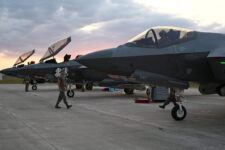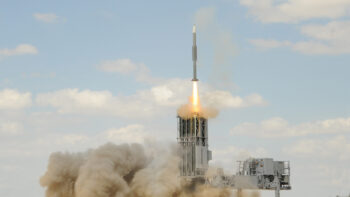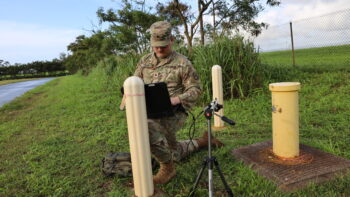
(Photo: U.S. Air Force)
UPDATED WASHINGTON: Defense giant Boeing may have to prove in person their case to Congress on why they opted to shutter their Kansas facilities last week.
“There are still a lot of outstanding questions” on Boeing’s decision to shut down their assembly plant in Wichita, KS and move those operations to the company’s facility in Washington State, according to a House source. Lawmakers have already begun informally pressing Boeing on the specifics of the decision, including the reasoning and timing of the closure, according to the source. When asked if top company officials could be called to answer those questions under oath before Congress, the source said that is “always a possibility.” The source could not comment on when those hearings could take place. House Armed Services Committee officials said that no formal request for hearings have been made regarding the Boeing plant closure.
Top defense analyst and Breaking Defense contributor Loren Thompson said he hasn’t heard of any imminent plans for congressional hearings over Boeing’s decision. That said, “I would not be surprised if they did,” he added.
If those hearings take place, the biggest question will be why Boeing announced the plant’s closure just as work is about to ramp up on the Air Force’s new aerial tanker, according to the source. The company beat out an Airbus-Northrop Grumman team last February for the right to build the Air Force’s new tanker. Boeing’s promise to bring thousands of American jobs to Wichita as part of the deal was a key factor in the company’s winning tanker proposal. “Is is appropriate to state something in your bid” and renege on that promise, the source asked. Political ramifications aside, there is little Congress can do in terms of driving tanker work back to Kansas even if hearings are held, Todd Harrison, senior defense analyst at the Center for Strategic and Budgetary Assessments, said.
But if Kansas constituents need someone to blame for the plan’s closure, it should be the Pentagon’s acquisition corps, according to Thompson. The department’s insistence on a fixed-price deal for the tanker prompted Boeing’s very aggressive — and ultimately winning — contract bid. Under the deal, the company assumed a massive amount of risk to meet the Pentagon’s push to get bottom-dollar on the deal. The Wichita plant closure was simply a case of collateral damage on Boeing’s part, as a result of meeting the department’s demands. If anything, the political fallout stemming from Boeing’s decision is an indictment of DoD’s flawed acquisition strategies, according to Thompson. The circumstances surrounding the Kansas plant closure is “just the latest indication that DOD does not take economic interests and impact in mind when making these decisions,” he said.
But those on the Hill pushing for hearings have their doubts on that argument. Opponents of the plant closure acknowledge that Boeing had to take the risk of a fixed-price deal in order to land the lucrative tanker contract. But Boeing “knew what the costs were when they bid,” the source said. “They know how aggressive they knew how aggressive they were.” Moreover, the Kansas plant had been on death watch for the past three years, according to the source. The company “went out of its way to put dying work” at the Wichita facility. The plant, which had been building airplanes and weapons for the Pentagon since World War II, had subsisted mostly on upgrade work for the Air Force’s B-52, C-40 and E-4B aircraft. The tanker program would have been the biggest work contract to date for the now-defunct plant. But other aviation firms are already looking to take advantage of the job pool in Wichita.
Today, Bombardier Inc. announced plans to expand their Wichita facilities by 400 employees. It is unclear how many of those jobs will be filled by former Boeing employees. While there is no way to tell how many former Boeing workers will fill those new jobs, Harrison noted that “there should be lot of crossover” between the old Boeing hands and new Bombardier employees.
Israel signs $583 million deal to sell Barak air defense to Slovakia
The agreement marks the latest air defense export by Israel to Europe, despite its ongoing war in Gaza.

























